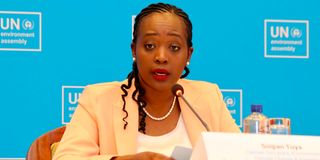Misogynistic claims against women leaders are deeply offensive

Cabinet Secretary nominee for Defence Soipan Tuya speaks at a press briefing at Serena Hotel in Nairobi on February 8, 2024. She has faced unwarranted scrutiny and cyberbullying simply for being nominated to a powerful position.
What you need to know:
- Misogyny and cyberbullying against female leaders are troubling global issues that undermine women's hard-earned achievements.
- These attacks perpetuate harmful stereotypes, discourage women from pursuing leadership roles, and contribute to the gender gap.
- Stronger enforcement of anti-harassment policies, education, and allyship from men are essential to combat this pervasive issue.
As a woman deeply invested in gender equality, I find the persistent misogyny and cyberbullying faced by female leaders deeply troubling. The recent attacks on Kamala Harris, the Democratic presidential nominee in the United States, and Soipan Tuya, Kenya's Cabinet Secretary nominee for Defence, highlight a disturbing global trend that we must confront head-on.
The accusations that women "sleep their way to the top" are not only baseless but deeply offensive. These allegations diminish the hard work, intelligence, and qualifications of women who have rightfully earned their positions.
Kamala Harris, for instance, has an impressive career spanning roles as a district attorney, attorney general, and US Senator before becoming Vice President. Yet detractors insist on focusing on minor issues to discredit her entire career. How, for example, does childlessness stop one from being a leaders?
Sexual favours
Similarly, in Kenya, Soipan Tuya faces unwarranted scrutiny and cyberbullying simply for being nominated to a powerful position. The assumption that women can only advance through sexual favours is a tired trope that needs to be retired. It's a clear manifestation of deep-seated misogyny that seeks to undermine women's capabilities and right to leadership roles.
This is particularly egregious given Tuya's impressive educational background. She holds a Bachelor's Degree in Law from the University of Nairobi, a postgraduate diploma in Law from the Kenya School of Law, and a Master's Law Degree from the University of Washington, Seattle. These qualifications clearly demonstrate her expertise and readiness for high-level leadership positions, yet detractors choose to ignore her accomplishments in favour of baseless accusations.
This pattern of harassment isn't limited to the former two. Countless women in high-profile positions face similar treatment. Hillary Clinton endured relentless sexist attacks throughout her career. In Africa, Dr Ngozi Okonjo-Iweala, the first woman and first African to serve as Director-General of the World Trade Organisation, has faced gendered criticism and online harassment throughout her career.
Diversity quotas
The impact of this persistent harassment sends a chilling message to women and girls everywhere: that no matter how hard you work or how qualified you are, your achievements will always be questioned and diminished because of your gender. This discourages women from pursuing leadership roles and perpetuates the gender gap in politics, business, and other fields.
What's particularly frustrating is the double standard at play. Men in similar positions rarely face the same level of scrutiny or accusations about their personal lives. When women are appointed to high-level positions, there's often an assumption that it's due to "diversity quotas" rather than merit. This ignores the fact that women have been systematically excluded from these roles for centuries, and that bringing diverse perspectives to leadership is valuable in itself.
The cyberbullying aspect of this misogyny is especially concerning. The anonymity and reach of social media platforms allow harassment to spread rapidly and intensely. Women leaders are subjected to a barrage of sexist comments, threats, and manipulated images or videos designed to humiliate and silence them. The psychological toll of this constant abuse cannot be overstated.
Online ethics
So, what can we do to combat this pervasive misogyny and cyberbullying? First, we need to call it out whenever we see it. Silence in the face of sexism only serves to normalize it. We must challenge the narratives that seek to undermine women's achievements and question their qualifications.
Secondly, we need stronger enforcement of anti-harassment policies on social media platforms. Tech companies must take responsibility for the spread of misogynistic content and disinformation on their platforms. This includes investing in better detection systems and taking swift action against offenders.
Education is also crucial. We need to teach digital literacy and online ethics from an early age, emphasising respect and empathy in online interactions.
While freedom of speech is important, there should be consequences for those who engage in targeted harassment and threats. Law enforcement needs to be better equipped to handle cyberbullying cases and protect victims.
Finally, we need more men to step up as allies in this fight. Misogyny isn't just a women's issue – it's a societal problem that affects everyone. Men in positions of power should use their platforms to condemn sexist attacks and support their female colleagues.
Women’s achievements should be celebrated, not undermined. Their success opens doors for future generations of women leaders. It's time we focus on their qualifications, ideas, and vision rather than engaging in baseless personal attacks.





